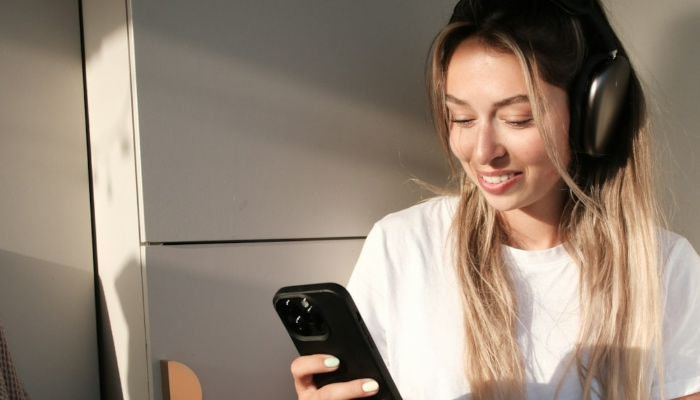Today we’re talking with two of the editors of the TV series, Wednesday. They are Jay Prychidny, CCE and Ana Yavari.
Jay joined us just a few months ago to chat about editing Scream 6. Jay has won or been nominated for numerous Canadian Cinema Editors Awards for projects including The Alienist, Orphan Black, Canada’s Next Top Model, The Next Step, and Lost and Found Music Studios. He also won a BAFTA for The Next Step. His other credits include the TV series Snowpiercer and Altered Carbon.
Ana edited the TV series From, which is currently airing. She was also an editor on The Handmaid’s Tale, and The Hardy Boys.
Art of the Cut: Wednesday
Thank you for joining me to talk about Wednesday. Tell me a little bit about collaborating with Tim Burton and how he is in an editing room. How do you deal with a new director, and what are you trying to do to make them feel comfortable or understand how they collaborate?YAVARI: Usually I have a quick meeting with them before shooting starts to see what direction they want to go in but generally I like to edit something how I would wanna see it on television myself. I'm quite a picky person.
PRYCHIDNY: I can attest to that. That's true!
YAVARI: I worked with Gandja and James Marshall on episodes five to eight, we would meet over Zoom to work on those cuts together.
Was it all remote collaboration?YAVARI: Yes, it was all remote for me. I was working in Toronto while they finished shooting in Romania and we worked full on eight-hour days together, four days per episode on each of the cuts.
Jay, what about you?PRYCHIDNY: Like so many things in this show, the first four episodes were a different universe from the last four episodes. The first four were directed by Tim. I was on location for all of that. When he was wrapped and he went home to the UK I would follow him to the UK because editorial is just really connected with Tim's process. About your question about “how do you make directors feel comfortable?” I think it’s all just the edit. I had no idea what he's used to seeing in terms of presentation.
In other words: music and sound effects.PRYCHIDNY: Yeah! Does he look at things roughly cut together? In retrospect I think he does. There's just no way I wouldn't present scenes to him that aren't ‘Ready to go on Netflix.’
YAVARI: I like to present the most polished scenes with sound that you would hear on television, music that's already done because you can find people start to wonder why doesn't this feel as impactful? The music would help those kinds of things so I don't like to leave those kinds of things out either.
PRYCHIDNY: I really want to be as polished as possible because I wanna make strong decisions that the director can then react against. You can talk as much as you want - for me, the edit speaks louder than anything else really.
A lot of the comedy of Wednesday is in the dwells. It's in the uncomfortable moments. Can you talk about building those or making room for them?YAVARI: I find the comedy in the awkward moments. It's something that makes somebody uncomfortable. I try to sometimes cut to the reactions of other people more, if Wednesday does something strange or somebody in the family is acting bizarrely. To me, it's not so funny what's happening. It's more how the normal people would react to something like that if that was happening in your life. So I, cut to Enid, cut to Tyler looking weirded-out by those kinds of things. So a lot of it also was ‘Mickey Mouse-ing.’ If somebody's eyes go to the left while they think that was weird., I’d put a kind of a ping with some strings at that moment too, to exaggerate it.
So you did some ‘Mickey Mouse-ing’ to temp score?YAVARI: Yes. I used a lot of music when I was temping. I used a lot of music from Servant. That shows’ a strange show where a lot of things that you see don't appear to be actually happening. I found those kinds of strings and cellos worked really well for bringing out those moments on Wednesday.
PRYCHIDNY: I think Ana and I came into this show from different directions. I really came in thinking this is like a fun comedy show. (Laughing)
YAVARI: I went in a different direction!
PRYCHIDNY: Yeah, Ana was making a horror show!
Those episodes are a little more horror.YAVARI: They are! The worst part was that they shot episodes one and two first, and then five and six and I was cutting six. We weren't allowed to watch Jay's cuts. I wasn't able to reference the tone of what he and Tim were trying to do. I had to go with what I thought the show was gonna be, obviously there's a lot of comedic moments in episode six but they're far subtler and they're not pointed at.
PRYCHIDNY: Jenna Ortega herself expected it to be a darker kind of show. To me, Wednesday's world is not a horror world. It's silly, it's sarcastic, it's sardonic. I was always thinking about it from Wednesday's perspective, and I want the world to feel how she sees the world.
I thought I saw something about her not blinking? Did you try to edit her so she doesn't blink?YAVARI: I froze some of her blinks, I created a lot of extra visual effects budget in my four episodes. I don't know if you did the same thing Jay?
PRYCHIDNY: Yeah, when I first started editing that was something Tim was very conscious of, I remember him just coming to me and out of nowhere saying, "Wednesday shouldn't blink" and I didn't even know what that meant or where that came from. I did think she should blink sometimes. I didn't think she should just never blink. It was a discussion that came up " Should she blink here? Is this an appropriate blink or not? " I got some blinks in for sure. (Laughing)
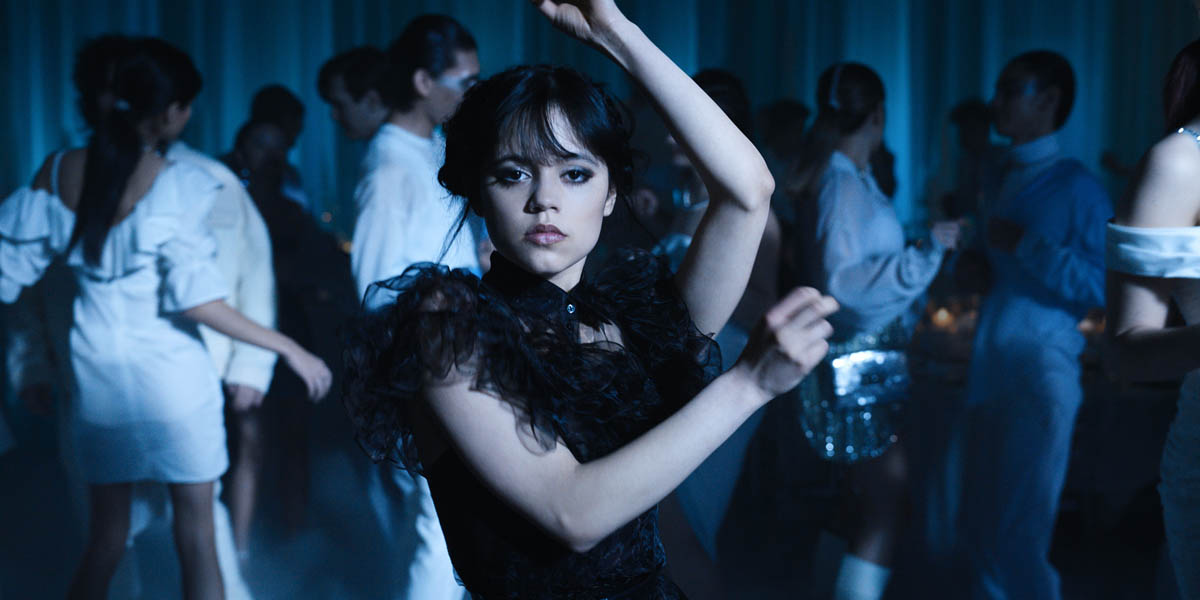
PRYCHIDNY: The thing I like best about it is it really gives you a perspective on our world. I love that in our show, Wednesday commented on social media and things like that. It's like you get to look at our world through a different lens a little bit.
Let's talk about the difficulty of the transitions in tone because there is a horror side of it and there's a little bit of the detective story side of it, and there's also the comedy side of it. Is there a trick to making those transitions in tone, or is that all taken care of by the script?YAVARI: Jay, did you consciously think about that while cutting?
PRYCHIDNY: Often I do, just because it's something that I really like. I've worked on a bunch of shows that really shift tone a lot and I just love that because to me that's an important tool in my toolbox of ‘How do you keep an audience engaged.’ I love when you have those opportunities to really switch into a different mode of storytelling. That makes it just pop and makes the audience sit up and ask, “Oh, what's happening now?” As opposed to everything just running together. So, I definitely try to make the emotional stuff really emotional. I try to make the comedic stuff really comedic and just find the horror elements and then just try to find ways of transition.
Sometimes it is just about slamming the audience into the next tone and sometimes that can work in a fun and surprising way. Sometimes it's a gear-grinding moment where the audience feels like they're being forced into something they weren't prepared for.
YAVARI: It does also need to be believable within the language of the show. I never felt like the tone switched too much, you don't ever wanna feel like you're watching a different show.
For example, in the seventh episode of Wednesday she goes on a date with Tyler and they wanted to show this softer side of Wednesday and Jenna performed it a couple of different ways. There was this girlier side of her watching this horror movie, which turned out to be Legally Blonde and she also performed it in a way where she was more grossed out or disgusted. We wanna go romantic comedy here but still within her realm.
PRYCHIDNY: Definitely for me, Wednesday's perspective was always the kind of grounding force for me, and the show is called Wednesday. Jenna is in almost every scene. So, it's a no-brainer for me to just play things from her perspective as much as possible and see the world the way she sees it.
One of my favorite scenes is in Episode Six when Enid and Wednesday have their argument about Wednesday not understanding what friendship is. For me to be able to play those kinds of things from her perspective and seeing her lost and adrift in other people's emotions and not knowing how to deal with that. I think that's a valuable thing to explore because that's a thing a lot of people face whether they're neurodivergent or not. For me, to explore that from Wednesday's perspective, I thought it was fresh and interesting.
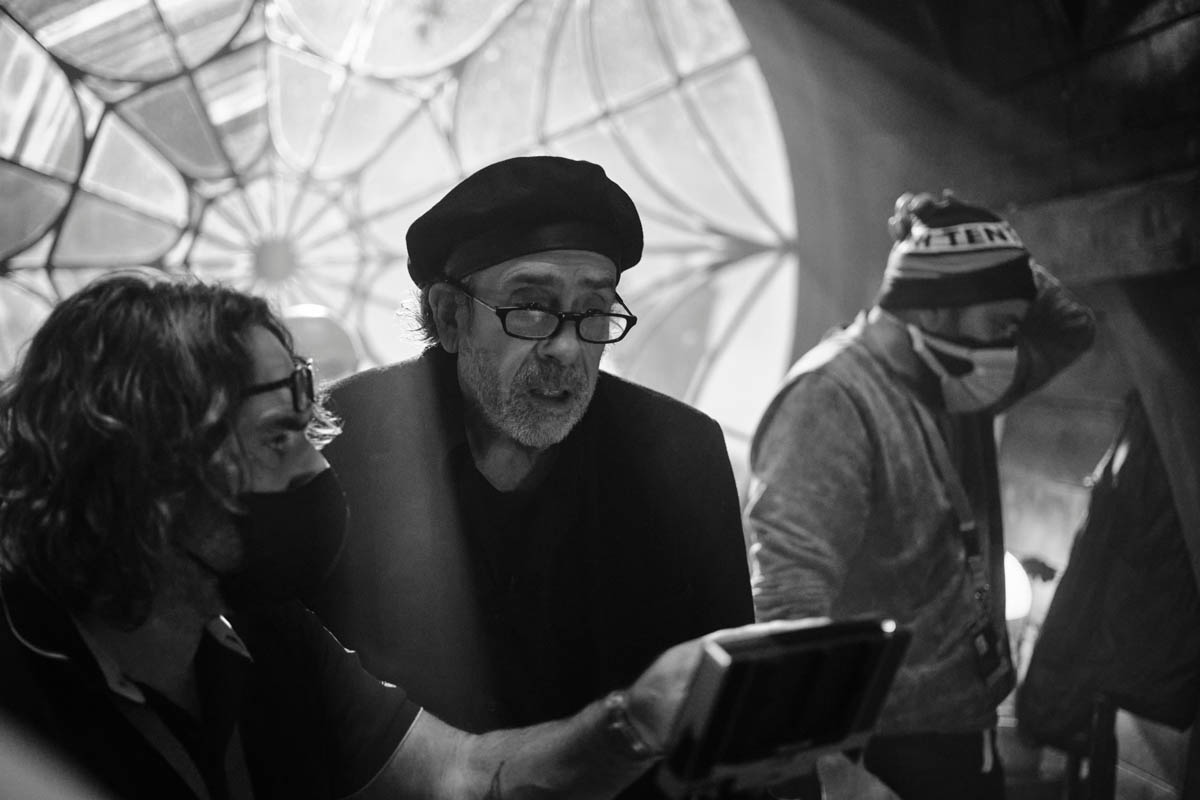
Director Tim Burton
YAVARI: You finally see Enid stand up for herself. I feel like we all have that friend who is the flower and then people who are the watering can. Enid is like the watering can friend, she'll take your crap all the time and keep giving and giving until they've had enough.
Wednesday is caught so off-guard at that moment. It's almost like it finally clicked. At that moment, it’s like oh, maybe I haven't been paying attention to other people.
In that scene in episode six, did you feel like you consciously needed to be in her perspective? And what do you do editorially to be in her perspective?YAVARI: That scene was an interesting balance, I find when I'm trying to be in someone's perspective more, I tend to stay on their reactions more. So it was about finding the right moments because you do wanna see Enid's big moment. So I did wanna see Enid get flustered. Her face turns a bit red. You wanna see her temper flare.
As soon as she says certain words about how Wednesday's making her feel - to stay on Wednesday as long as possible and Jenna just, she had these sort of beautifully watery eyes that I think I stayed on the shot of her reaction of realizing what she's done while Enid was yelling at her. Not to be on the person who's actually yelling for her very much, and to be on the one who's realizing what she's done.
PRYCHIDNY: Initially I had this idea of the show's called Wednesday. It's about Wednesday. I'm gonna try this thing of just being on her reactions way more. This is something that Ana and I were in sync with, even though we hadn't discussed it together but that was definitely something I tried.
I'm especially thinking about it in the opening of episode two – Wednesday’s in the therapist's office and the scene just starts on her face and the dialogue from the therapist is just happening in the background and you're just staying on Wednesday's face the whole time. I just had this preconceived notion that I wanted to try doing that more in this show.
It was interesting because Tim shoots in a very traditional style and his things are edited in a very traditional way. His footage is so traditional and iconic and they're almost comic book panels. They're just as wonderfully composed as a still, almost.
It's not like you can go crazy with the editing. But that was one thing I tried to do. And when he saw that scene, he'd sometimes be surprised that things were edited that way. I remember with that scene specifically, he was like “oh” and you'd see him kind of processing it.
He'd say, “Oh, this isn't what I expected to see”.
YAVARI: But you made it better! (Laughing)
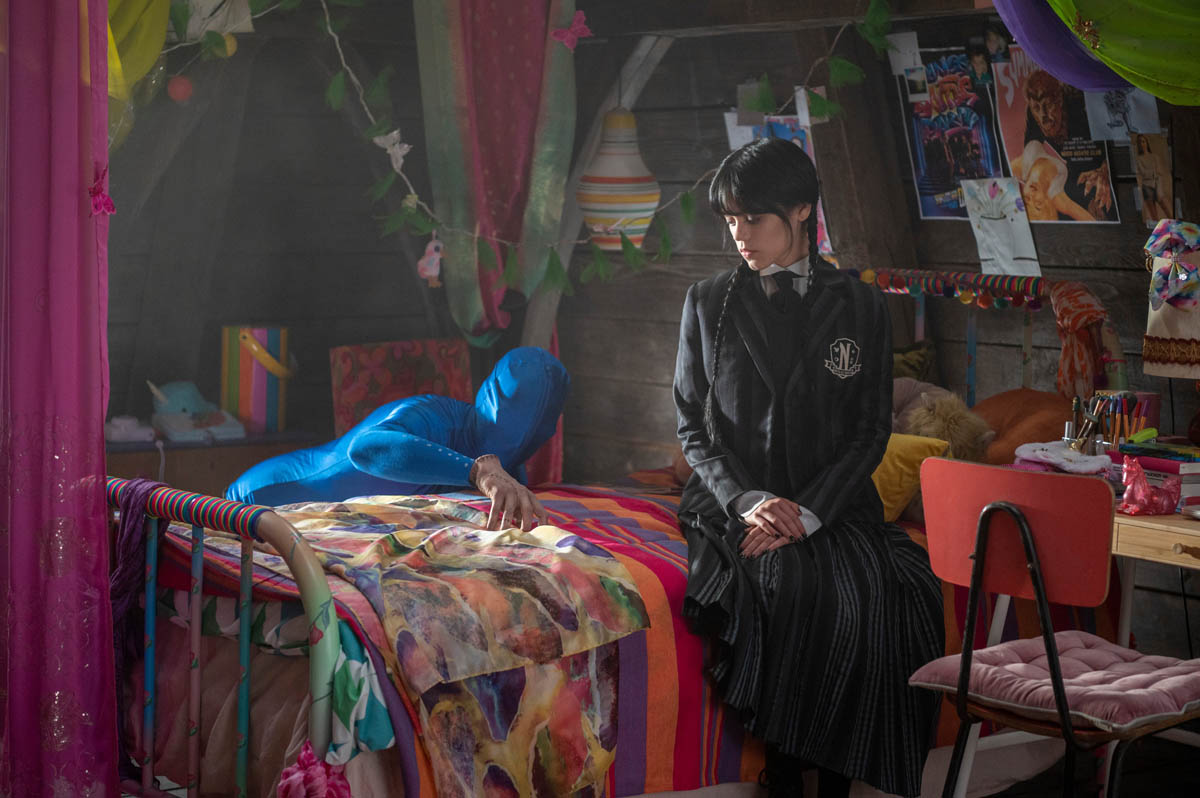
PRYCHIDNY: I'd say “great!” I just had this idea, I thought I'd try it but I'll edit it the other way and you can see that and you can decide what you like better. More often than not he would say “No, that's okay. We'll just go with this.” So he trusted that, which was really nice and he was open to seeing things.
It's not like I did anything crazy outside the box on this show because you can only go so far with that footage. I tried to tweak it a little bit and more often than not he was really open to seeing things done in surprising ways that he wasn't expecting.
I can think of a very specific editorial idea, probably Jay's the best person to talk about this - the flashbacks. Whenever she would have these "Touch somebody and her head flies back in a vision" moments, can you talk about cutting those and any experimentation? Ana was talking about the fact that she didn't get to see your episodes. How did she deal with those once you've already established a rhythm or a way to do those flashes?PRYCHIDNY: They were done in isolation. I did mine differently from Ana's, and then I think they are different - they aren't consistent even within my own episodes, they're not entirely consistent.
When you get to those moments, it seems like you have got to be on the frame. If you go too far or too short that flashback doesn't feel like it's gonna work.PRYCHIDNY: With the beginning of production there's a lot of energy and nervousness and insecurity. The producers kept saying we have these flashbacks. We don't know what we're doing with them and they were scripted as being very punchy and visceral, Tim shot them like normal scenes and so there was this kind of anxiety "Oh they're supposed to be like this, but they were shot like this."
The showrunners on this show - Miles and Al - have very strong opinions and Tim Burton obviously has very strong opinions. The kind of tension between them was something I had to be aware of a lot of the time. I was aware that Al and Miles really wanted them to feel punchy and visceral. For me the style of that flashback with the flashes and the cutting was just my attempt to try to serve both masters in a way.
They worked great to me! I feel like they were shot the way they needed to be shot to pull that off. Ana, do you have any thoughts on those flash moments?YAVARI: We had a couple of those in episodes five to eight and because I knew they were in the first four episodes as well, I was allowed to see Jay's cut before it had gone to the network. After Tim's cut went to the network we were all allowed to watch it. I remember being very excited and relieved because I thought they were great so this is the style that I have to copy. You made my job easier.
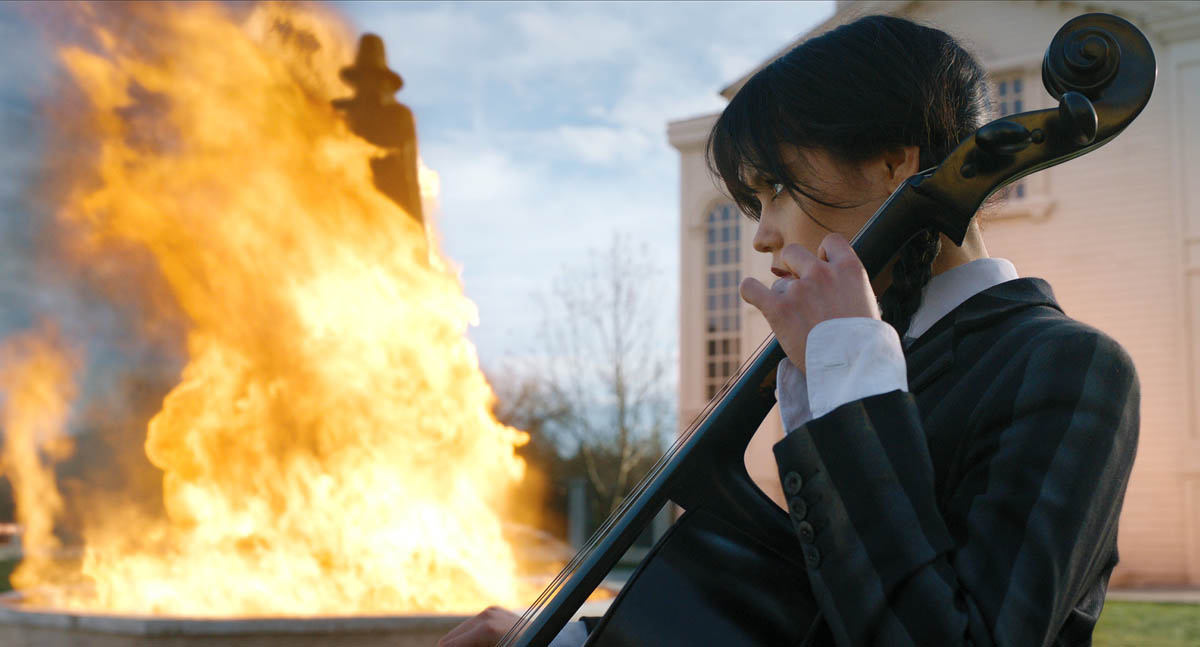
PRYCHIDNY: The idea of taking something shot and making it feel really punchy and visceral. That was what I came on and I really didn't have any other ideas. Luckily everyone liked it, it worked for Tim, it worked for Al, and Miles.
Ana, what did you see in his edit that you needed to copy?YAVARI: It was the rhythms, how quick, what parts we concentrate on a little bit longer, what things we do quickly. There was also a lot of reframing, there was a lot of recoloring, which I do think changed. I don't remember if our offline coloring was what ended up being on screen.
There were some frame rate differences which my assistant Tom Loundsbury helped with a lot. I had done more of the rhythms offline, those were the flashbacks for when she would get a vision but then in my episodes there's a point where Wednesday starts to accuse Xavier and she says, "When you were at this location" then we go into those flashbacks.
My initial thought was that those aren't visions, those are just flashbacks and that they're very different. I didn't make them stylized at all in my cut. It was quiet, I didn't have sound bites that punched us into them. They were just quick shots in silence in the Nightshades’ library with Xavier, for example. When I was working with James Marshall, the director, he wanted to punch them up a little bit.
How did you stylize them? Color or sound?YAVARI: In the flashbacks, things got slowed down then lots of scale-ups. If you were seeing someone talking, right at the end of that shot it would zoom in really quickly before cutting out with an echoey sound, those kinds of things.
While we’re talking about tonal changes, did it ever happen where you eliminated a scene or rejiggered something and caused two tones that weren’t meant to be juxtaposed?YAVARI: I didn't have that exact problem but I had other problems. Episode eight, the finale had 25 minutes cut out of it. There were a lot of scenes at the end that got completely cut out because they were closing Bianca's storyline, Eugene's storyline. There were all these kinds of things. They took them out for time. It didn't really affect the tone because they were within the tone of the end already.
PRYCHIDNY: They were probably taken out for pacing more than time, no? We didn't have time restrictions.
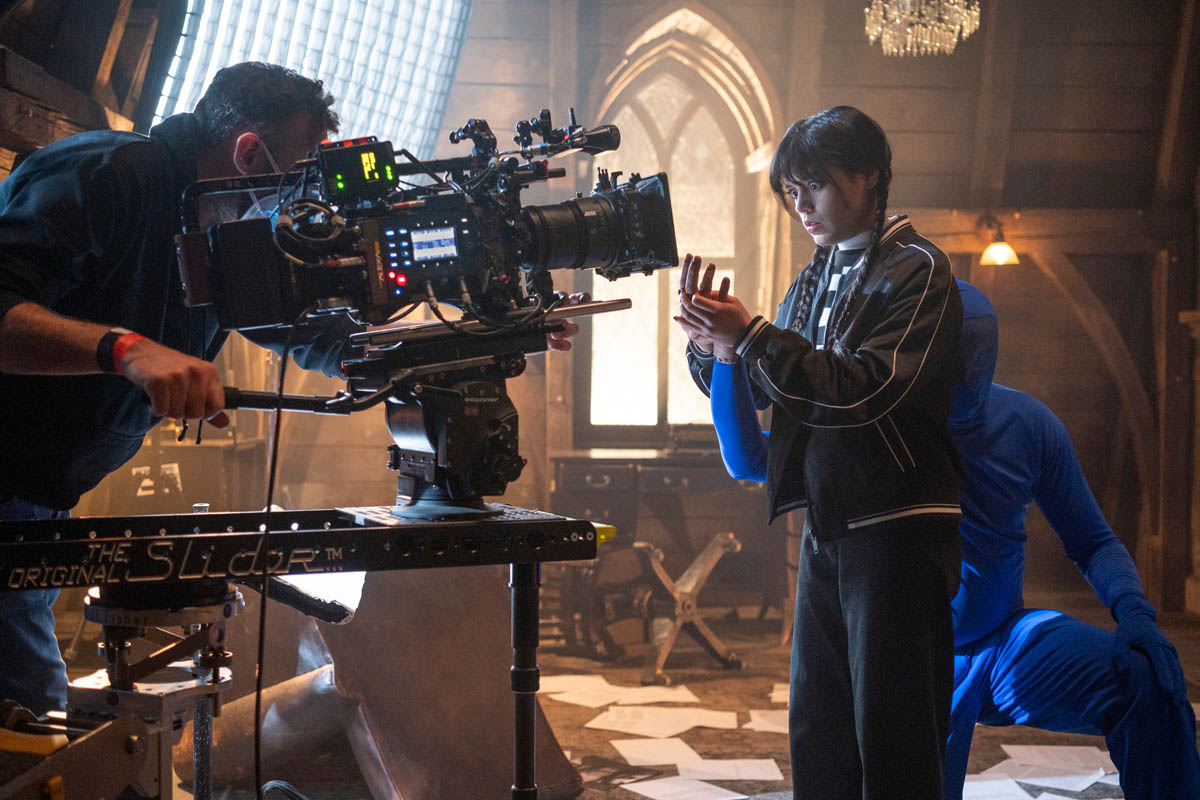
YAVARI: Yeah, for sure and they had to cut some scenes that had a lot of exposition. For example, Wednesday saying goodbye to Enid. She's packing her typewriter at the end of episode eight. She thinks she has to leave the school. That scene was like seven minutes long and I think it ended up being four minutes long in the end because we took out so much dialogue. The tone was never a problem when we sewed it together, it was more the placement of where the actors are.
James Marshall knew that it was such a long scene that he'd have to keep things moving in some way. He had the actors pacing around the room, which was great but then when you cut it out, people are in the wrong part of the room. That was a huge challenge in trying to find the subtlest and most elegant way to chop lines out and make it not look like people teleported in the room in the middle of a scene.
PRYCHIDNY: With so many things with this show, the first four episodes were really in a different universe from the last four episodes. On so many levels. The first four scripts did not have a lot cut out of them. I think part of that is very early on there were concerns these scripts were way too long, there was a lot of effort in the beginning to really cut them down, cut out unnecessary words, cut out unnecessary beats. They thought they were gonna be over an hour at least that's how they were timed but Tim shoots so leanly that we would just burn through running time. I think my first cuts were like, 45 minutes sometimes.
YAVARI: Oh, wow!
PRYCHIDNY: Normally I want to cut dialogue like crazy out of every scene because I just want things to move along. I did not have that issue here, a lot of the dialogue was there. It had its place and obviously you're making trims and that sort of thing but in terms of dramatic cuts not really in the first four episodes.
That desire to cut dialogue out of a scene. We've all been there but do you ever do that in the editor's cut?YAVARI: It’s never that the dialogue is bad, it's just sometimes it's a performance problem that it didn't quite work as you might picture it. Other times it was pacing and I remember texting Jay because you had worked with Alan Miles before and I hadn't. "Do you know if they get upset?" Some showrunners don't love that you're cutting out their words and I remember you told me that you do it often yourself. They don't seem to mind and maybe you can bring it up.
PRYCHIDNY: Generally, I don't try to cut dialogue. What I try to do is subliminally tell people this dialogue is not necessary. (Laughing)
YAVARI: That's right! I forgot I learned that from you. You mentioned trying to make the crappy line pass so quickly and make it so unimportant that it's forgettable.
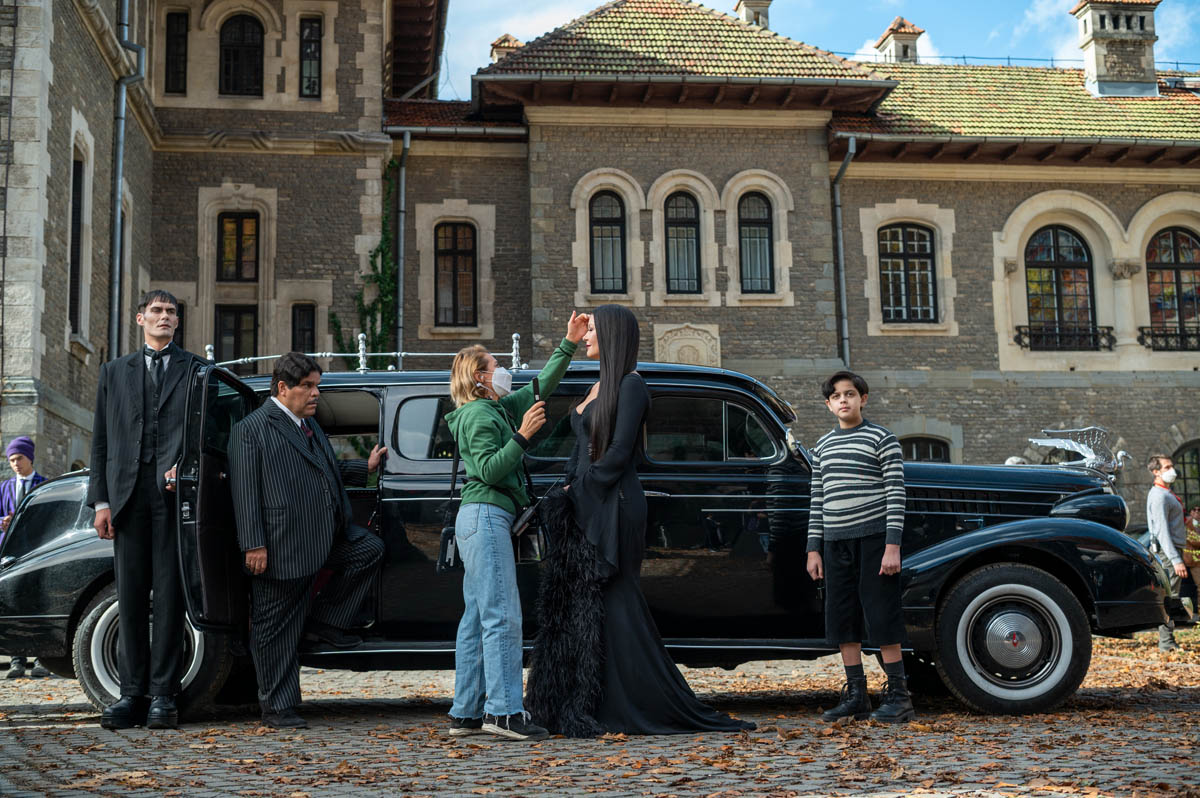
PRYCHIDNY: I always want to feel like the scene's moving forward. That's where I start to have a problem. If I feel like there's dialogue or words that are not pushing us forward. When I come up with those kinds of lines, usually what I try to do is make them so quick and so unimportant that anyone watching the cut would just go "This is superfluous!" I try to keep the dialogue intact as much as possible but really I just place my emphasis in the scene where I think it belongs.
I just really hate the feeling of cutting a line of dialogue and someone saying "Why'd you cut that? That was really important." It feels like you're trying to trick them in some way and sometimes they feel like you're trying to trick them. I don't like giving people that feeling,
I do try to keep the dialogue in as much as possible. The only time I do is if it's really making it impossible for me to present something the way I think it should be presented. Sometimes even in my first cut I'll try to do something creative with cross-cutting scenes together and if I just feel like that's the right way to go and these certain lines are making it impossible then I will cut them and say “This is just what I'm trying.” I'll be transparent about it.
YAVARI: I've never cut out a big back-and-forth. If I want to cut something like that out because I'm confident that it would majorly improve a scene, I might do it but then I will put it at the end of the episode. I'll present it after the end credits to make sure they know this is how I think it works best but I'm not hiding something from you.
I'm always thinking about cutting off the first three or four lines of a scene or the last three or four lines of a scene. That's where I have the desire. I've learned my lesson because I did that and it, it backfired horribly.YAVARI: It upset the writer?
Yeah, and the other thing somebody pointed out to me was you've got a process where those lines will come out. It's better for the director to see them. You've got a couple of months or at least a couple of days or weeks for them to say, "We could probably lose those," but if you lose them at the beginning, they have a stigma to them that from then on. The director might want to protect them because you cut them out.YAVARI: That is so true, that's happened to me. You go and cut a whole scene out or something because you think it's going to make it work better and it ends up backfiring, they get more protective over it.
PRYCHIDNY: Ana to come back to what you said about Al and Miles. I think that was because there was a cut of the episode they'd already seen and then you were tasked with trying to make it all better. Al and Miles are not precious about their dialogue. They're probably the most critical! "What is this? Why is it here?" (Jokingly)
I said you're being asked for your perspective and you're being asked to make it better. You should have free reign to do whatever you want at that point because it was already deep into the creative process.
Anything else you two wanna chat about? Anything you feel like you want either highlight?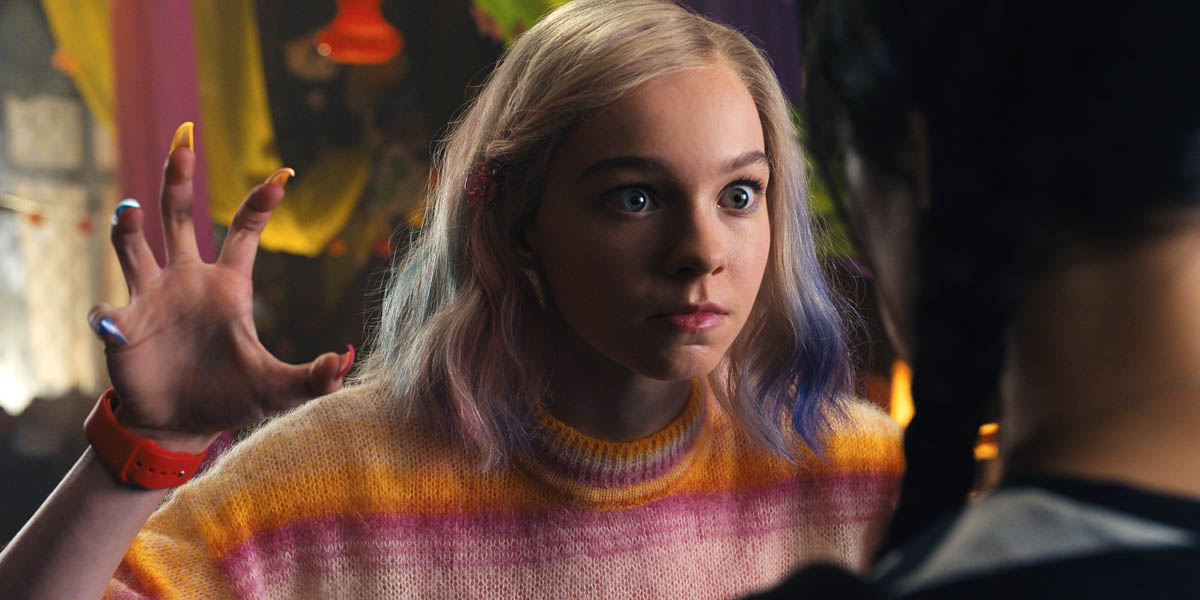
PRYCHIDNY: What did you love about the show Steve? Why did you love it? I wanna ask you the questions. (Laughing)
I loved every part of the show. I was captivated from pretty much two or three minutes into the first episode. I'd never seen anything with Jenna in. I thought she was fantastic. Of course, the shooting of those graphic novel compositions is fantastic. It's interesting that the two of you edited without seeing the other person's work because it did give you a chance to start as a comedy and then become more and more horror as it went on. I think that was an endearing thing for the audience. It helps you to become immersed in it before you become terrified!YAVARI: They shot the episodes in the order one, two, five, six, three, four, seven and eight. I feel that we got lucky in the sense that you did the first four episodes Jay and not -
One, Two, Five, Six.YAVARI: That's right because then I wonder tonally how it would've worked. If it would've been Jekyll and Hyde or maybe it did naturally work because the scripts do get a bit darker, I find.
PRYCHIDNY: People do notice that at the midpoint the show kind of changes which I think was part by design and part not. It was created by such a different creative team.
YAVARI: Yeah, we even had a different composer!
PRYCHIDNY: Different composer, different production team, different cinematographers. On a lot of levels it was a lot different and audiences do notice that it's different, I think some people see it as a positive.
The two of you did a great job. Thank you so much for talking about it with us and good luck on your current projects.PRYCHIDNY: Thank you, Steve.
YAVARI: Thank you. Thank you so much for having us!


